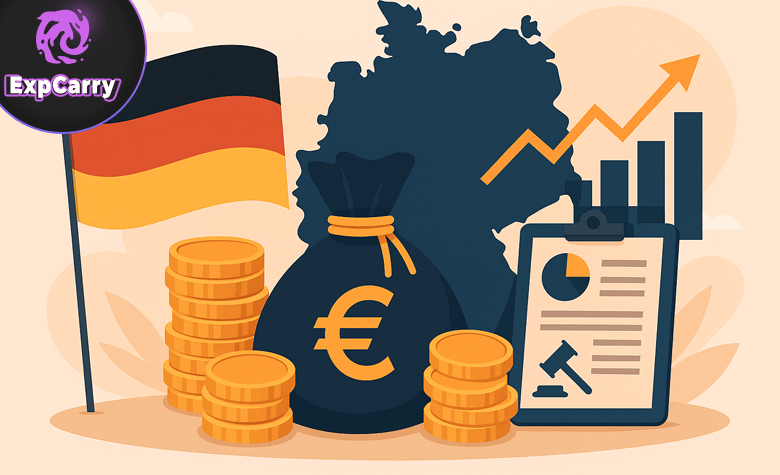Germany's Gambling Tax Revenue Continues to Hold Steady at The €2.9 Billion Mark

Germany’s gambling market ended the year 2024 on a familiar note, as revenue in the form of taxes remained steady at €2.49 billion—precisely the same as the previous year. While the headline figure tells a tale of stability, a closer examination of the data tells a more complicated story of increasing concern, black market growth and persistent tension in the regulation. As Europe’s largest regulated market for gaming, Germany’s stable return on tax indicates the strength of its licensed operators. Industry insiders nevertheless caution that underlying pressures are building up in this flatline, not least in the case of the online casino sector, as they have started to contract in the face of restrictive policy.
Regulation Continues to Squeeze Online Operators
The German gambling model is characterized by strict regulation, foremost the 5.3% turnover tax implemented in 2021, stringent advertising bans, deposit caps and monitoring of player activities. These measures, implemented under the Interstate Treaty on Gambling (GlüStV 2021), were designed to shield players and combat addiction. Practically, they have also caused enormous headaches for licensed operators.
2024 tax data verifies this developing pressure. As reported by the Esports Insider in figures cited by the organization, tax revenue for casinos and slots experienced a 16% decline compared to 2023 levels—a dramatic fall following a 47% collective decline since 2022. That’s approximately half the market disappearing within two years.
In the face of these challenges, licensed sites find it hard to keep up, even when pitted against the increasing popularity of black market sites. Even the best German casino sites—those that comply in all respects, provide honest play and are focused on responsible gaming—are losing patrons to unregulated rivals that avoid rules and offer higher bonuses, a more complete library of games and more intense advertising.
Unlicensed Operators Capitalize on Loopholes
What's pushing this mass migration? In a nutshell: user experience and accessibility. While Germany's stringent rules protect players, they've also inadvertently provided the perfect opportunity for black market sites to thrive. Offering fewer restrictions, quicker onboarding and unregulated game types, the offshore operators now have increasing market share in the online betting marketplace.
Estimates claim that 20% to 40% of Germany's internet-betting traffic currently goes through unregulated channels. This contrasts sharply with neighboring regulated jurisdictions in Denmark and Sweden, where legitimate operators capture well over 90% of the market.
The result? Not only is player safety compromised but also the German state misses out on tens of millions of annual tax revenue. The market effectively leaks—and licensed operators end up getting wet.
A Silver Lining in the Storm
Even as the online casino market has downturned, sports betting remains positive. Over the first eleven months of 2024, tax collected in the vertical increased by 5% year-on-year. The rise indicates that bookers are still seeing value in betting on licensed sites, especially for major sporting events such as the UEFA Euro 2024 qualifiers and top Bundesliga match-ups.
However, overall betting volumes have reduced following the imposition of the turnover tax. Industry figures indicate that the overall stakes have reduced by about 15% since 2021. Thus, although the state's share has risen, the real amount bet has a downward trend.
This discrepancy between tax receipts and overall volume makes long-term sustainability even more questionable. Is it possible to sustain growth in tax revenue when fewer individuals are betting? Operators and regulators will have to answer that question sooner rather than later.
States Like NRW and Bavaria Lead the Charge
A federal state-by-state breakdown of the taxes on gambling reveals North Rhine-Westphalia as the largest national contributor, with €535 million. Close behind are Bavaria and Baden-Württemberg, which returned €350 million and €300 million, respectively.
These regional discrepancies point to how population density, betting habits, and local enforcement can all affect revenue. Betting flourishes in cities with strong sporting cultures. In rural or conservative areas, traditional lottery and traditional casinos reign.
Such difference highlights the need for regulation to adapt to localized behavior patterns—what works in Berlin will not work in Bremen.
Industry Voices Call for Urgent Reform
As the evidence becomes clearer, so does the call for industry reform. Both German and foreign stakeholders contend that existing rules on taxation and advertising no longer serve a purpose. With the legal market share diminishing and the black market on the rise, the operators are advocating for a competitive regulatory framework.
Recommendations include revamping the turnover tax as a profits-based system (modeled on more successful international models) or increasing advertising allowances for licensed operators. Others also recommend reviewing stake limits on digital slots and allowing more dynamic game releases within the regulated environment.
These reforms would not undermine player protection but enhance it—by pushing users away from hazardous, deregulated markets.
Looking to 2025 and Beyond
At present, the €2.49 billion figure makes for a comforting headline. However, the underlying dynamics of Germany's gaming industry indicate more profound structural problems. If not resolved, these problems can lead to long-term erosion of tax revenues and consumer confidence.
Operators need to have clarity. Players need convenience. The government needs to have control. Getting a new balance between these three disparate interests will prove to be vital as Germany enters 2025. One thing is for sure: standing still may not suffice.